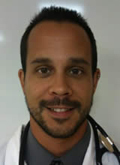
“Hello, Dr. Vincent. It is good to see you again.”
“Did you speak English the last time we saw each other?” I ask the young Haitian man, his cheeks much fuller than before.
“No. I learned since then,” Tomas says and smiles wide, shaking my hand and placing the other on my shoulder, pulling me towards him. “Have you seen Nickadem yet? He wants to say hello as well.”
Their bright faces are a nice welcome home though I haven’t seen them in over two years, not since I nearly fired both of them.
In May 2010, life in Haiti was chaotic at baseline, and in a massive tent hospital with over two hundred employees and a hundred American volunteers, it was difficult to maintain any semblance of order. Some people were stealing, others were not doing their jobs. Tomas and Nickadem were definitely not thieves, but had shirked their responsibilities, and I brought them into the command tent to rectify the situation. I’d never fired anyone, and the prospect of leaving two young men unemployed in post-earthquake Haiti ached my bleeding heart, and I caved after fifteen minutes of them begging for their jobs.
The unintended consequence of sparing their jobs meant that they were forever happy to see me, and eventually I was really happy to see them. Two years later, I’m thrilled to see them still working for Project Medishare, an affirmation of the work that the organization has done in rebuilding the local infrastructure since the earthquake.
I haven’t been to Haiti since 2010. The tent hospital has moved to a concrete structure that serves as Haiti’s only critical care facility. My father has been a dozen times over the last two years, and always comes back with news of the old employees. “The boys down there told me to say hello to you. They want to know when you are going to come back.”
I pass the first two days back at the hospital greeting people with whom I worked for six weeks in 2010. There are close to twenty employees that have been with Project Medishare since right after the earthquake, and coming back to the hospital after so much time, I hadn’t expected to see any of them. We share hugs and smiles, telling stories about patients who we were fond of, or commiserating on the difficult times in the tent hospital when it flooded during the rainy season. I am terrible at remembering names and Haitian names are particularly difficult (Getro, Dorvil, Kensey) so I ask them to repeat their names, trying to re-commit them to memory. I could never forget the amazing work that each of them did and look forward to building new memories with them.
There are a number of success stories, people with no prior education or training who now can support themselves with their skills and are helping to rebuild Haiti. Walking through the hospital, I am ecstatic to see each one of them again, proud of what they have accomplished since we last met.
One employee, fluent in English, had applied unsuccessfully for a job as a translator and took a job as a patient transporter instead; now he is the night manager for the entire hospital. Another man with a college degree in business was trained as a wound care specialist and is now as proficient at his profession as any wound care nurse in the United States.
Amputees were trained how to mold custom-made prosthetics in the prosthetics lab and how to counsel other victims on life as an amputee in Haiti. A paraplegic patient that I cared for in 2010 now works sewing school uniforms for children and crafting handbags for sale. The job allows him to get out into the community, reducing stigmas about those with disabilities, and providing him and others with spinal cord injuries with gainful employment.
“The retractors are on the back shelf there, and the one-eighth screws are in the tray on the bottom left,” Tomas, a Haitian man with no formal training, said in English to a group of senior doctors from the United States. He knows all the tools and supplies that are used in the hospital, procuring them for the medical staff when called upon. He started as a patient transporter in a tent hospital after the earthquake, speaking no English and was almost let go; now he has a marketable skill in the healthcare industry, meaning that he’ll have a job in Haiti for the rest of his life.
That’s progress, moving forward, beyond where we were prior to the earthquake.
Vincent DeGennaro is an internal medicine doctor and a global public health specialist at the University of Miami’s Department of Medicine and works part time in Haiti with the nonprofit Project Medishare. See his An American Doctor in Haiti blogs.